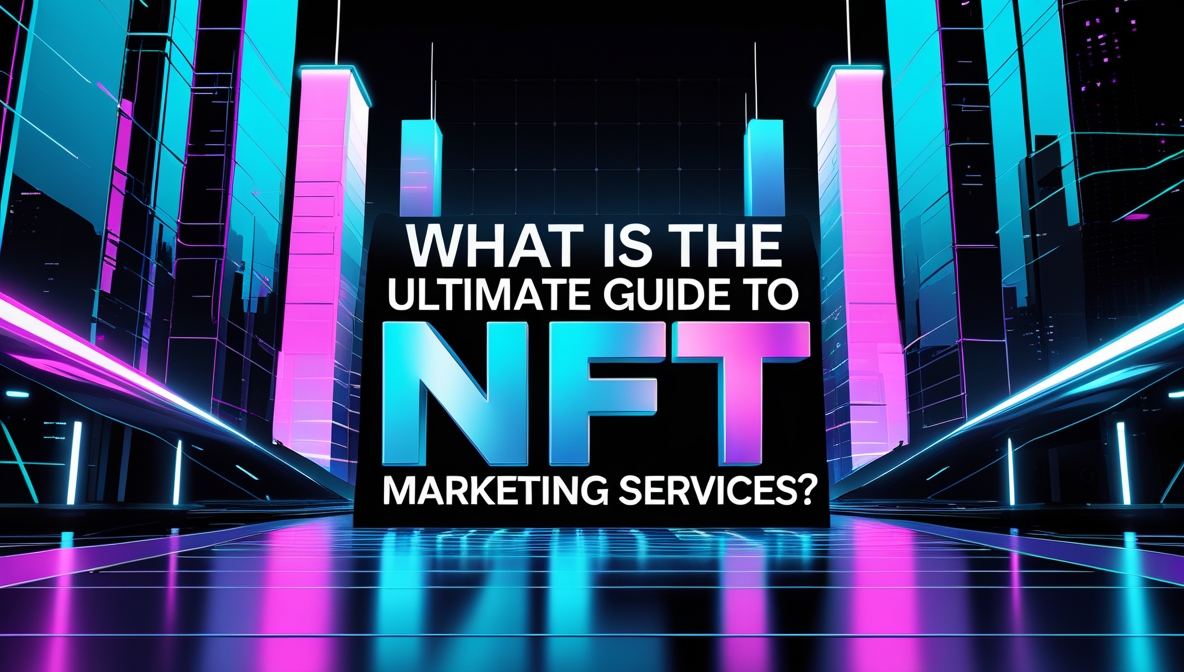Many artists, collectors, and big companies are interested in the NFT space, which has grown quickly. But many creators make the mistake of starting projects without a good marketing plan, thinking that the art would sell itself. However, this method rarely succeeds. Many promising NFTs have failed to gain any traction due to inadequate marketing strategies.
In today’s crowded market, a distinctive idea or design isn’t enough. To be successful, you need to be seen and get people to interact with you. That’s where NFT marketing services come in. These services are crucial for getting the word out, developing excitement, and linking initiatives with the proper people.
It’s important to know how successful projects market themselves, whether you’re an individual artist, a brand trying to go into Web3, or an agency that helps NFT launches. In this piece, I’ll explain what NFT marketing services do, why they’re important, and how they can assist make ensuring your project doesn’t go ignored.
What Are NFT Marketing Services?
NFT marketing services employ innovative strategies to promote NFT projects in the unique realm of Web3. NFT marketing is different from regular marketing in that it needs a unique approach that combines innovation, extensive community involvement, and a thorough understanding of crypto culture.
These services usually involve creating a unique brand identity, building active online communities, working with influencers, and running targeted paid advertising campaigns. NFT consumers are frequently quite involved in decentralized platforms and appreciate authenticity. Successful marketers do more than just basic marketing; they work to build trust, get people excited, and provide long-term value for their communities.
Connecting meaningfully with people is the goal, not just gaining attention. In this context, marketing is as much about strategy as it is about storytelling and culture. We know that the best NFT campaigns are the ones that really grasp the space and get people involved in a way that feels real and natural.
Why NFT Projects Need Marketing?
In the world of NFTs, “If you build it, they will come” doesn’t happen very often. A lot of amazing initiatives with beautiful art or useful tools fail because no one knows about them. In a market In a landscape where thousands of NFTs are released every day, marketing is essential rather than optional. If others can’t see your project, it can easily get lost in the noise.
Marketing also helps people trust you, which is important in a world full of frauds and rug pulls. NFTs also need a community to thrive, and active marketing helps people communicate with one other, which is what a community needs to grow and stay strong. People who buy art aren’t simply interested in it; they’re also searching for prestige, a sense of belonging, and possible returns.
Marketing helps them get what they want. Also, a good campaign can make people feel like they have to act quickly and get excited about it. In summary, having excellent art or utility alone won’t make you successful. To make your NFT initiative stand out, you need to do continuous, planned marketing.
Key Components of NFT Marketing Services
When I think about what NFT marketing involves, several main areas come to mind. They all work together to create a strong, engaging presence for the NFT project.
Branding and Identity Development
They say first impressions matter. NFT projects need a clear brand identity that tells their story and mission. We help projects craft logos, design visuals, and develop narratives that resonate with their target audience. This helps buyers relate to the project beyond just the artwork.
Community Building
Community is the heart of NFT success. I’ve seen many projects fail because they ignored their communities after launch. Managing platforms like Discord and Telegram is crucial. We assist in:
- Creating engaging content for discussions
- Organizing AMA sessions
- Moderating chats to maintain a positive environment
Social Media Marketing
Social media is where NFT conversations happen. Twitter, Instagram, and LinkedIn are top platforms. They use these channels to share news, drop teasers, and announce events. We often recommend:
- Consistent posting schedules
- Visual content like GIFs and videos
- Interaction with followers to build rapport
Influencer and Thought Leader Outreach
I can’t stress enough how important influencers are. NFT influencers have built trust with their followers, making their endorsements powerful. We differentiate between micro-influencers who have niche but engaged audiences and macro-influencers with broader reach.
PR and Media Coverage
Getting featured in NFT-focused media or a crypto business builds legitimacy. We help projects craft press releases and pitch stories that catch journalists’ attention. This coverage often sparks wider interest.
SEO and Content Marketing
They might think SEO is just for Google searches, but it matters here too. Creating blog posts, guides, and guest articles boosts visibility on search engines and educates potential buyers. We focus on relevant keywords without stuffing and on producing helpful content.
Paid Advertising
Paid ads on platforms like Twitter or Google can drive quick traffic. However, they must comply with crypto advertising policies. We help manage ad campaigns carefully to maximize ROI while avoiding bans or account suspensions.
Email and Newsletter Campaigns
Building an email list lets you communicate directly with interested buyers. We create newsletters that share updates, exclusive offers, and behind-the-scenes info to nurture loyalty.
Choosing the Right NFT Marketing Agency
When they start looking for marketing help, many NFT creators feel overwhelmed. People often ask me, “How do I choose the right agency?” Here are some pointers I share:
- Look for agencies with proven NFT experience, not just general marketing.
- Ask to see their past projects and results.
- Check if they are transparent about their strategies and pricing.
- Beware of agencies promising overnight success or guaranteed sales.
- Ensure they understand your vision and are willing to customize their approach.
Common Mistakes in NFT Marketing
I’ve watched NFT projects stumble over simple mistakes that could’ve been avoided:
- Overhyping without substance: Promising too much without delivering causes disappointment.
- Ignoring community feedback: They should listen and respond to their supporters.
- Poor timing: Launching during market downturns or without building anticipation hurts sales.
Here’s what we advise to stay clear of these traps:
- Be honest and realistic about what your project offers.
- Engage consistently with your community before and after the launch.
- Plan your marketing timeline strategically around market conditions.
Case Studies of Successful NFT Marketing Campaigns
I want to share examples to highlight what good marketing looks like:
- CryptoPunks: They built one of the earliest NFT communities, creating exclusivity and word-of-mouth buzz.
- Bored Ape Yacht Club: They used strong branding and community events, making buyers feel like part of an elite club.
- Art Blocks: By focusing on algorithmically generated art and artist collaborations, they found a loyal niche audience.
From these cases, I learned that clear identity, community focus, and creative storytelling make a difference.
The Future of NFT Marketing
NFT marketing is changing quickly, thanks to a few important factors. AI-powered content production is becoming necessary since it lets producers make captivating, high-quality pieces quickly and easily. At the same time, the growth of metaverse events and immersive experiences is giving NFT communities new avenues to connect and interact with each other.
Gamifying NFT ownership is also getting more people involved, making them want to do more than just buy and sell. Marketing techniques are also changing. Instead of trying to make one-time sales, they are now trying to create long-term relationships with customers and earn their trust and loyalty.
NFT initiatives need to constantly change and improve their marketing strategies to stay competitive in this fast-changing environment. To stay relevant and build their communities in the changing digital landscape, projects will need to embrace these trends. In general, the future of NFT marketing depends on being creative, interacting with people, and making connections that last.
Conclusion
NFT marketing services are necessary to turn ideas into active communities and boost sales. These services include anything from developing a brand and getting people involved in your community to strategic storytelling, which are all important parts of making your product stand out in a crowded market.
Knowing what these services can do for you and picking the correct marketing partners can mean the difference between a successful NFT launch or project and one that fails. If you’re getting ready to launch or want to improve your current NFT, it’s important to start early by connecting with your audience and telling your own story.
Even though the NFT space is competitive, people who put in the time and effort can make a lot of money. Make your mark before it’s too late. Get in touch with a marketing specialist who can help you reach your goals, and let’s work together to make your idea a successful reality. Now is the time to start your next-level NFT success!




